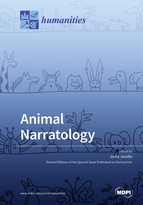Animal Narratology
A special issue of Humanities (ISSN 2076-0787).
Deadline for manuscript submissions: closed (1 January 2017) | Viewed by 186604
Special Issue Editor
Special Issue Information
Dear Colleagues,
Storytelling is often cited as one of the characteristics that distinguishes humans from animals. Yet a look at world literature reveals many animals as the narrators of our tales. Animals speak not only in fables and fairy tales, but also narrate novels, voice love poems, and deliver philosophical treatises. Across genres and time, both wild and domesticated animals give accounts of their lives and their worlds, which usually contain human beings. Animal narrators negotiate their relationship with humans, while defamiliarizing the human way of perceiving the world. And yet, these texts are written by human authors who chose an animal voice, a specific species, and a literary genre for a particular purpose—one that tends to be as much, if not more about the human as it is about the animal. In fact, analyses have predominantly focused on the human side of these texts until the recent “animal turn” in literary studies. This focus on the animal in literature vows to take the animal seriously, which has been generating new readings and discoveries regarding texts from the canon and beyond. Literary animal studies has the potential to reveal the history of animal narration, such as clusters of animal species, type, or even breed at certain times; to interrogate animal narrators’ appeals to particular audiences, from children’s books to political satire; and to uncover writers’ ways of avoiding censorship and persecution by channeling an animal voice in their works. In addition, concepts from animal agency to zoopoetics have increased the theoretical complexity of the investigation of animals in literature and are connecting animal studies to some of the concerns of fields such as environmental humanities, race and gender studies.
However, studies of animal narration are still scant and scattered, and there seems to be a need to close a perceived gap between classical scholarship on animals in literature (such as, for instance, Theodore Ziolkowski’s insightful 1983 genealogy of “philosopher dogs” in the Western canon) and newer theoretical premises brought forth by literary animal studies that petition for reading the animal as animal. There also appears to be a perhaps problematic tendency toward taxonomy inherent in approaches to both animals and narration that has yet to be addressed. This special issue of Humanities on the theme of “Animal Narratology” therefore aims to paint a fuller picture of animal narrators from various species, at different times, and from a variety of literary traditions. The breadth of this approach is to be supplemented with systematic considerations of the specific texts and contexts, so as to account for larger developments relevant to the literary history, genre, and narratological strategies exemplified by each animal narrator. Humanities thus invites contributions that bring together the close reading of texts containing animal narrators with (a) theoretical deliberations about narratology (such as dialogism, diegetic levels, empathy, focalization, framing, graphic storytelling, metaphoricity, realism, reliability, representation, serialization, simultaneity, structure, suspense, symbolism, etc.) and (b) relevant questions of ethics, religion, race, gender, sexuality, history, philosophy, sociology, science, and the arts. Texts from literature in any language are welcome (with translation), and an even distribution of Western and non-Western literature is desired. Articles will be due January 1, 2017 and should be between 6000 and 8000 words in length. Interested contributors should send a proposal of 250–500 words with a short bio or their CV to the guest editor, Dr. Joela Jacobs, at [email protected] by July 20, 2016. You will be notified of your preliminary acceptance (subject to peer review of the completed article) within two weeks, and questions are welcome at any time. Humanities is an international, peer-reviewed, quick-refereeing scholarly open access journal with a focus on the core values of the Humanities. There is no article processing fee, and this special edition is slated to appear both online and in book format (e-book and print on demand).
Dr. Joela Jacobs
Guest Editor
Submission
Manuscripts should be submitted online at www.mdpi.com by registering and logging in to this website. Once you are registered, click here to go to the submission form. Manuscripts can be submitted until the deadline. Papers will be published continuously (as soon as accepted) and will be listed together on the special issue website.
Submitted manuscripts should not have been published previously, nor be under consideration for publication elsewhere (except conference proceedings papers). All manuscripts are refereed through a peer-review process. A guide for authors and other relevant information for submission of manuscripts is available on the Instructions for Authors page. Humanities is an international peer-reviewed Open Access quarterly journal published by MDPI.
Please visit the Instructions for Authors page before submitting a manuscript. English correction and/or formatting fees of 250 CHF (Swiss Francs) will be charged in certain cases for those articles accepted for publication that require extensive additional formatting and/or English corrections.
Keywords
- animal narrator
- animal studies
- close reading
- genre
- human-animal studies
- literary history
- literary studies
- narratology
- speaking animals
- species
- world literature






